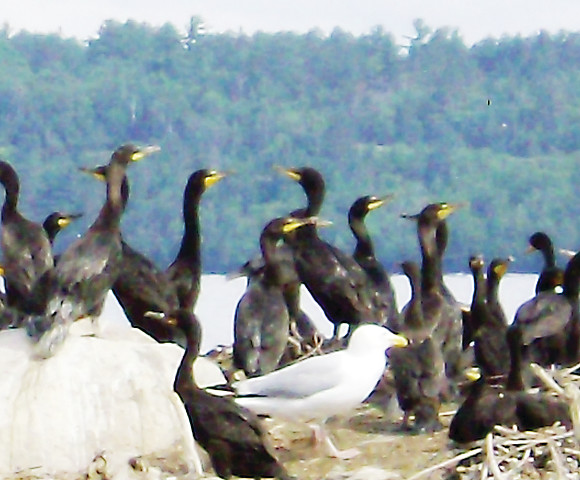Support the Timberjay by making a donation.
Cormorant control vacated by court order
Federal judge nixes Fish and Wildlife Service control efforts across the country, including on Vermilion
LAKE VERMILION— A federal court order has put efforts to control cormorant numbers on Lake Vermilion and elsewhere in the U.S. on hold until the Fish and Wildlife Service (FWS) can better document …
This item is available in full to subscribers.
Attention subscribers
To continue reading, you will need to either log in to your subscriber account, or purchase a new subscription.
If you are a current print subscriber, you can set up a free website account and connect your subscription to it by clicking here.
If you are a digital subscriber with an active, online-only subscription then you already have an account here. Just reset your password if you've not yet logged in to your account on this new site.
Otherwise, click here to view your options for subscribing.
Please log in to continue |
Cormorant control vacated by court order
Federal judge nixes Fish and Wildlife Service control efforts across the country, including on Vermilion
LAKE VERMILION— A federal court order has put efforts to control cormorant numbers on Lake Vermilion and elsewhere in the U.S. on hold until the Fish and Wildlife Service (FWS) can better document the need for the measures and explore possible alternatives.
The court ruling, issued May 25, vacated the legal authority for the control efforts that have been underway on Lake Vermilion’s Potato Island for the past three years. Under the program, federal wildlife officials shot some adults and oiled the eggs of nesting cormorants at their colony on Potato Island, which prevented the eggs from hatching. The effort, over the past three years, yielded a significant reduction in the number of cormorants , which many anglers believe take large numbers of game fish.
The recent court order put a halt to the control measures before the cormorants began nesting this year, which has led to a significant increase in the number of young cormorants now found on Potato Island. And that has anglers renewing their concerns and complaints to the Department of Natural Resources about the cormorant population.
But Edie Evarts, Area Fisheries Manager for the DNR, said there’s little the state agency can do until the FWS resolves its issues with the courts. “That decision pretty much tied our hands,” she said.
The Lake Vermilion control effort was part of a nationwide depredation order approved by the FWS that gave the federal agency the authority to control double-crested cormorants where there was documented damage to aquaculture operations or recreational fisheries. The FWS approved such an order on Lake Vermilion after DNR fisheries managers made the case that a large spike in cormorant numbers was having a negative impact on the lake’s perch population.
But the group Professional Employees for Environmental Responsibility, or PEER, filed suit against the FWS, arguing that the FWS had failed to adequately document the need for, and environmental consequences of, their depredation order. “FWS has not seriously contested that its EA was markedly deficient,” wrote U.S. District Court Judge John D. Bates, in his May 25 decision vacating the FWS depredation efforts. “The failure to update its analysis from the previous renewal of the orders was striking. And its examination of alternatives was nominal at best,” wrote Bates.
The judge admonished the FWS and urged it to seriously explore viable alternatives to the measures it has used in recent years.
While the court order prevented control measures this year on Lake Vermilion, it remains to be seen how long the court order might stand. The judge is requiring the FWS to provide better documentation of the need for cormorant control, a process that agency officials have indicated could take about seven months to complete. If the agency can provide sufficient justification, the judge would have the option of allowing reinstatement of the control effort. Whether that happens in time for the 2017 cormorant breeding season remains to be seen.






